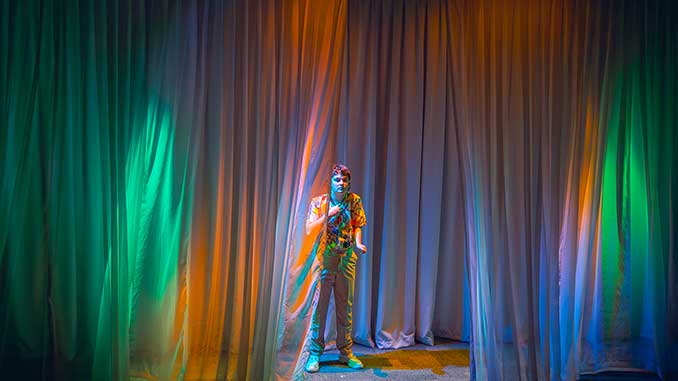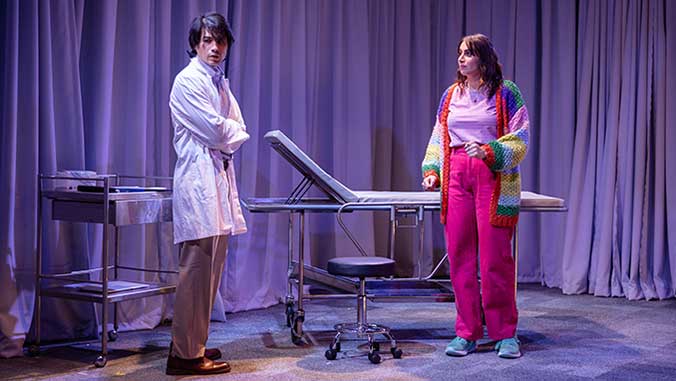 Alistair Baldwin’s uproarious new play, Telethon Kid opens with a montage you’d likely see in the waiting room of a bougie private practice: extreme close-ups of yellow flowers, laughing children on hospital beds; stock-photo retirees joking with their dead-eyed doctors and underscored by a general platitude -‘take care!’.
Alistair Baldwin’s uproarious new play, Telethon Kid opens with a montage you’d likely see in the waiting room of a bougie private practice: extreme close-ups of yellow flowers, laughing children on hospital beds; stock-photo retirees joking with their dead-eyed doctors and underscored by a general platitude -‘take care!’.
It screams Big Pharma or an early 2000s Dove campaign; a supercut of ham-fisted appeals to humanity that are ironically dehumanizing. There’s another close-up of laughing patients and their clinicians, another ‘take care!’. Saving lives is great PR!
It’s the press kit for medical big wigs, Geneuris and the first of many examples of the soulless marketisation of real people that Baldwin’s debut spends 90-minutes expertly skewering.
Telethon Kid is the second mainstage show this year to dramatize what philosopher Olúfémi O Táíwò terms ‘elite capture’; a term that describes the bastardisation of identity politics at the hands of systems motivated by conservative, and late-stage capitalist values (profit, efficiency, etc.).
Think of Bud Light using a transwoman to endorse their brand before promptly ignoring them when they receive death threats, or Universities including stock photo portraits of diverse cohorts in their pamphlets while underpaying their staff. It’s a bad faith progressiveness that loses sight of the very people it intends to represent or help.
We saw this play out most recently in Declan Furber Gillick’s portrait of contemporary indigeneity in Jacky. Telethon Kid considers it from the perspective of disability and its relationship to the medical and pharmaceutical industry.
Geneuris is the premium authority on ‘Orphan diseases’ – the term for ailments that impact a small number of the population. Their press kit montage is the preamble to a set of presentations from a shortlist of doctors clamoring to receive funding for their research into such ailments.
The final pitch comes from a Perth-based researcher – referred to only as Doc (Max Brown) – who presents tissue samples taken from a patient. Soon after and said patient, twenty-something Sam (William Rees), walks on stage in a tie dye midriff to deliver a show stopping rendition of Tomorrow from Annie.
 Sam’s a disability influencer, body-positive activist and four-time recipient of Make-A-Wish; a confident mix of youthful charisma and unbridled self-centeredness. He wears his narcissism on his sleeve as an empowering reclamation of a life spent being infantilized and patronized as ‘special’ because of his disability.
Sam’s a disability influencer, body-positive activist and four-time recipient of Make-A-Wish; a confident mix of youthful charisma and unbridled self-centeredness. He wears his narcissism on his sleeve as an empowering reclamation of a life spent being infantilized and patronized as ‘special’ because of his disability.
It’s not long before Doc is drawn into his magnetism and the pair trade the lukewarm white wine of the conference’s open bar for a steamy night together in their hotel room.
The repercussions of this night drive the rest of the show. Baldwin is attentive to the ways in which terms like consent, disability, ethical practice, even doctor and patient mean different things in different contexts and each scene places one person’s definition against another’s.
A doctor’s idea of medical consent can be jarring for a hook-up to hear. A marketing head’s conception of ethical practice, equally so. What disability means changes according to an Instagram grid; or during a one-night stand, a medical trial or a video montage for stock holders.
Baldwin – whose previous credits include The Weekly and Get Krack!n – examines, questions and critiques the nature of these changes with a keen eye to their human costs and a bawdy, darkly humorous writing style sharpened by his personal experience (as a comedian born with a rare variation of muscular dystrophy).
Still, the show does occasionally fall prey to the classic pitfalls of the debut playwright. Sam is often relegated to declaring the show’s thesis with repeated monologues that teeter on the edge of being overwritten. And Rees, though a charismatic performer, struggles to deliver them in a way that makes them feel earned.
Likewise, Sam’s near joke-a-second speech pattern moves through segues with the rapidity of stream of consciousness, and Lee falters trying to navigate each thought convincingly.
Already underwritten, Doc’s character – though performed with warmth and restraint by Brown – becomes more of a backboard for Sam’s solo repartee than a real, fully-formed character. And their moments of intimacy, while refreshing to see not relegated to a well-timed blackout, are curiously lacking passion – a particularly noticeable absence considering the importance of the scene for the rest of the show.
 Nkrumah is a stand out as KT, the self-assured marketing head for Geneuris. Baldwin smartly avoids placing blame at the feet of individuals alone and KT, for all her brassy humour, becomes one of the show’s most deeply humanizing portraits of the ways in which well-meaning individuals can be subject to systems that dehumanize them.
Nkrumah is a stand out as KT, the self-assured marketing head for Geneuris. Baldwin smartly avoids placing blame at the feet of individuals alone and KT, for all her brassy humour, becomes one of the show’s most deeply humanizing portraits of the ways in which well-meaning individuals can be subject to systems that dehumanize them.
Sound design by Malthouse-staple Danni Esposito is a heady mix of tense synths and EDM beats and the occasional ear-worm by way of a The Veronicas remix. But a lighter touch would have been more effective. Scenes underscored by a near-constant synth-heavy score makes for distracting ambience, and some early compositions seem a bit out of step tonally with the scenes they’re paired with.
Set design by Christina Smith embeds the play in the sterile environments of a clinician’s office and an academic conference with towering grey curtains and washed out patchwork carpets. These curtains, opening and closing to signal transitions, work best when their billowing movements and often sluggish maneuvering are used intentionally. Rachel Lee smartly throws them under warm yellows and bright whites in lighting design that saves the set’s intentionally flat colour scheme from appearing sterile.
But the star is Baldwin’s writing. Minor production faults belie a script that wades into complex waters with verve and humour. A darkly humorous, and glitteringly camp conclusion cements Telethon Kid as a bold and exciting new work, proving a fitting finale for a show that critiques the dehumanising spectacle disabled bodies are so often subject to with a metatheatrical nod to Sam’s (and Baldwin’s) agency in a final flourish that affords him empowerment on his own terms – as macabre and bawdy as they might be.
Telethon Kid
Beckett Theatre – The Malthouse, 113 Sturt Street, Southbank
Performance: Wednesday 2 August 2023
Season continues to 13 August 2023
Information and Bookings: www.malthousetheatre.com.au
Images: William Rees stars as Sam | Max Brown and Ashley Apap | William Rees, Max Brown and Effie Nkrumah – photos by Tamarah Scott
Review: Guy Webster
